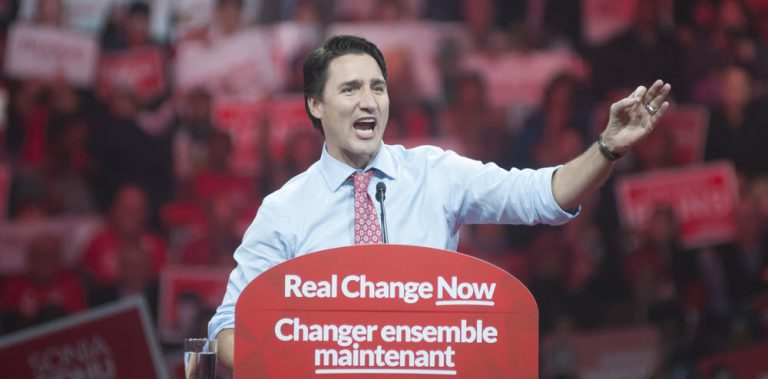Fast change and slow change in Canadian culture
Oct 19, 2016 · by Lucie Houde

Most values change slowly most of the time. And then once in a while, political changes try to shift them quickly. We’re living in one of those moments in Canada now.
In 2015 the Canadian Federal elections passed power from a Conservative government to a new administration under the Liberal politician Justin Trudeau.
There is real political change happening impacting society and it has been a good time to review and update the cultural profile of Canada in CultureConnector. By coincidence, the original Canadian cultural profile in CultureConnector’s predecessor service “Argonaut” was created about the time when political power was passing from the Liberals to the Conservatives in Canada in 2004-2006.
Even slow changes make a difference over ten years
For ten years, the Conservatives were a steadying influence on Canadian economy. They managed the country cautiously:
- rise of technology in the workplace
- globalisation of business and working life
- emergence of new values associated with Generation X, Y and Millenials, including the importance of work-life balance and job satisfaction, and less long-term commitment to a single employer
- greater opportunities for women at work, together with an aging population meaning more people are combining careers with family responsibilities
These changes are common to many developed economies. Canadians have adapted well, without great shocks or divisions and has managed the 2008 economy crises better than most developed countries.
Trudeau introduces a period of faster change
Since Justin Trudeau’s arrival as Canada’s Prime Minister last year we’ve seen the multicultural dream of his father resurface (Pierre Trudeau was a leading politician of the 1960s, 70s and 80s). That dream of a multicultural Canada is now promoted more than ever before. Today, the young Trudeau uses the media to be seen with various cultural groups or religious groups. He has also shown strong support for lesbian, gay, bi-sexual and trans people and feminist causes.
The intense interest in multiculturalism is new in 21st Century Canadian politics. Trudeau has his supporters, the true believers, and his opponents, but it seems that the new attention to multiculturalism are really trying to accelerate some changes which were already happening in Canadian society.
No fear of culture clash
Some Canadians now tend to see the similarities between people but not always recognise the potential sources of culture clash in a deeper sense. We may be overlooking the challenges ahead.
Promoting mutliculturalism could lead to the regrouping of people from the same cultural background without integration to Canadian society. We don’t know the future social impact in the long run. Currently it is OK to be this kind of Canadian or that kind of Canadian. There are multiple ways to be Canadian. This is strongly reinforced by the Trudeau government’s multicultural policies.
Risks of multiculturalism without integration
Canada has quickly become a rainbow nation of diverse cultures. Multiculturalism can succeed with active participation from the intercultural industry, helping communities, companies and government agencies to integrate diverse team members or whole groups in our work projects, institutions and neighbourhoods. Currently, the speed of change could run ahead of the capacity of the intercultural industry to support it and maintain the positive, integration pathway.
Integration: a personal experience
In Quebec Province, where I am based, we have placed a focus on intercultural relations and integration. A good example of integrated multiculturalism is in Montreal. I live in a multi-ethnic area. On my street my closest neighbours are Czech, Russian, Italian, Portuguese, VietNamese, Chinese, Jamaican, Pakistani, Indian, some English and French Canadian, plus me and my multicultural household. This is not unusual in Montreal, in Côte-des-Neiges sector alone, 75 nationalities live altogether. Although zooming out you can still see that the West of the city is more English-speaking while the French-speakers are concentrated in the East and Plateau.
Best wishes for rapid change
There is a rush of interest and acceptance of diversity in Canada. Many Canadians welcome this, but good wishes alone are not enough to guarantee success. Integration of new comers goes hand in hand with finding a job. Canadian workplace requires systemic changes. Organizations need to take on a higher level their diversity and inclusion practices, kills, knowledge, understanding and techniques to run operations in an environment of great diversity.
The new imigrants I work with all call Canada home and are overwhelmingly determined to succeed and contribute to society and they are a great asset in the workplace. Think about it: experiencing immigration as an individual has required competencies any employer would benefit from, to name a few:
- Project management
- Adaptation
- Risk taking
- Achieving goals
- Flexibility
- Various perspectives
- Speak many langages
In Canada, we are living diversity. Canada has received 320 000 immigrants this past year. A record not met since 1910 according to Statistics Canada, when the country was colonizing Western Canada. A lot of crosscultural challenges to be met, and we, interculturalists are making sure we meet the challenges for all to succeed.
Trudeau photo by arindambanerjee / Shutterstock.com
